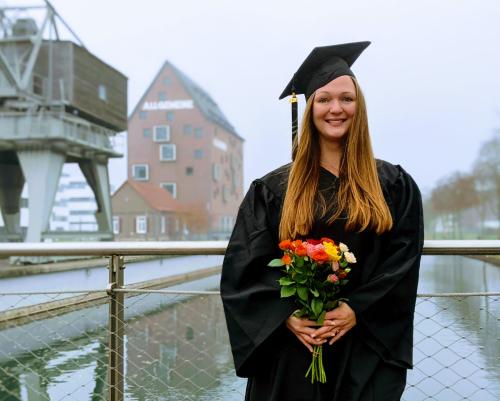Mirjam Schaar
|
Alumna Position Graduated Faculty Degree programme |
Why did you decide to study Sustainable Tourism at Rhine-Waal University?
Before I started my studies, I first did an apprenticeship as a hotel manager. At the time I decided to continue with a bachelor’s degree, Rhine-Waal University was the only place in Germany where I could pursue a degree in Sustainable Tourism – and that was something I deeply cared about. My travels abroad had shown me how devastating the negative impacts of tourism can be on host countries and local communities. While travel can never be fully sustainable, we can at least actively work to make it as responsible and environmentally conscious as possible.
What also drew me to Rhine-Waal was the beautiful campus atmosphere and its strong international orientation – I immediately felt it was the right place for me.
You graduated in the midst of the Covid pandemic. What were your next career steps?
Initially, I had planned to gain international work experience right after my bachelor’s. However, due to the Covid pandemic, I decided to continue my studies and pursue a master’s in Sustainable Development at the University of Applied Sciences Bochum, while living in Cologne. Afterwards, I had the chance to gain some truly unforgettable work experience abroad, including at a safari lodge in Kenya, which is managed as a community-based initiative by Maasai warriors. It was an incredible and eye-opening experience that gave me a deeper understanding of sustainable tourism in practice. After my return to Germany, the job with the hotel association opened up.
You’re currently working as a Sustainability Officer for the German Hotel Association in Berlin. Please tell us more about your tasks.
As an association, we represent the interests of around 1,500 members from the German hotel sector at the political level. A key part of our work is also to break down complex political decisions and developments regarding sustainability in a way that is accessible and relevant to our members.
Accordingly, I work in a highly project-oriented way. Recently, for example, we launched an ESG tool designed to support hotels in their sustainable transformation journey and help them meet increasingly complex sustainability reporting requirements.
In addition, I am involved in several working groups. At the moment, for example, I am collaborating with the German Sustainability Code (DNK) and sustainability managers from various hotels to develop a practical guideline for future sustainability standards in the hospitality industry.
I am also in regular contact with sustainability officers from our member hotels, write articles, attend conferences and trade fairs, and travel frequently – sometimes even across Europe in cooperation with our umbrella organization, HOTREC. I also organise and go regularly on our "sustainability roadshow," where I hold talks and moderate discussions in different German cities.
What do you enjoy most about your job?
What I enjoy most about my job is the incredible variety of tasks and the chance to actively help shape the future standards of a more sustainable hospitality industry.
I also truly value the opportunities to travel and meet key industry stakeholders, which allows me to build a strong professional network. The flexibility and autonomy I have within our department make every day unique and exciting. And above all, I appreciate the trust and freedom my boss places in me, which empowers me to take initiative and grow. This role constantly challenges me to step outside of my comfort zone and learn something new every single day.
Which skills did you acquire during your studies that have proven to be particularly useful for your career?
Naturally, I gained a strong foundation of theoretical knowledge during my studies, which gave me a comprehensive understanding of the tourism sector and prepared me well for my career. However, what I found particularly exciting were the practical excursions and field trips, enthusiastically organized on a regular basis by Professor Dr Reiser.
Beyond academic content, the study programme taught me various essential soft skills: how to overcome personal insecurities such as the fear of public speaking, and how to comfortably communicate in English thanks to daily interaction with international students. I also learned how to stay motivated and structure my work effectively – skills that continue to support me in my professional life today.
From this winter semester onwards, Sustainable Tourism will be taught in English instead of German. What are your thoughts on this change?
I believe this is a very smart and timely decision, since few industries are as international as tourism. It will also likely make the programme more diverse and international, bringing together future changemakers who can drive sustainability in tourism on a global scale.
Which advice do you have for future Sustainable Tourism students?
Embrace the full experience of your studies: get involved in local initiatives, participate in excursions and extracurricular programs, and consider joining the university’s political or student bodies to help shape campus life and policy.
After graduation, you’ll have the opportunity to work in exciting roles and contribute to making the world’s most beautiful industry more sustainable – truly pioneering work! But most importantly, enjoy this unique and exciting time in your life. I’ll always look back on my years in Kleve with a big and thankful smile!

